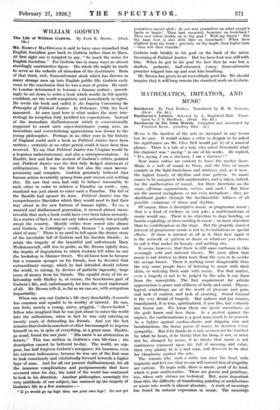WILLIAM GODWIN
The Life of William Godwin. By Ford K. Brown. (Dent. 16s.) MR. RAMSAY MACDONALD is said to have once remarked that English Socialism goes back to Godwin rather than to Mark. At first sight one is tempted to say, " So much the worse for English Socialism." For Godwin was in many ways an almost startlingly unattractive figure. His whole life might be made to serve as the reduclio ad absurdum of the doctrinaire. Born of that thick, rich, Nonconformist stock which has thrown so _many strange men up into English public life, Godwin early came to the conclusion that he was a man of genius. He came :to London determined to become a famous author ; accord- ingly he sat flown to write a book which would, he felt quietly confident, set the world completely and immediately to rights. He wrote the book and called it An Inquiry Concerning the Principles of Political Justice. In February, 1793, the book appeared. At once (and here is what makes the story inte- resting) its reception fully justified his expectations. Instead of the immediate disillusionment s which is conventionally supposed to await such super-doctrinaire young men, an immediate and overwhelming appreciation was shown to the young philosopher. Perhaps in no other year in the history of England could such a book as Political Justice have been written ; certainly at no other period could it have been thus received. To say that Political Justice was Utopian would be a hopeless understatement, and also a- misrepresentation. As Hazlitt, first and last the aeutest of -Godwin's critics, pointed out, Political Justice was the first fully fledged statement of utilitarianism. It was the first but also the most uncom- promising and complete. Godwin genuinely believed that human action invariably sprang-from-pure reason and nothing else. He saw that men had only to behave reasonably to each other in order to achieve a Paradise on earth ; ergo, mankind was just about to' enter such a Paradise. The fall of the Bastille had opened its door. Political Justice was the comprehensive Baedeker which they would need to find their way about in the new fortress of human rights. To us, a wearied and disillusioned generation, it seemed almost incon- ceivable that such a book could have ever been taken seriously. As a matter of fact, it was not only taken seriously but actually swept the country. Hostile critics were cowed into silence and Godwin, in Coleridge's words, became " a captain and chief of men." There is no need to tell again the dreary story of the inevitable fall of Godwin and his Jacobin friends ; to relate the tragedy of the beautiful and unfortunate Mary Wollstonecraft, still less to probe, as Mr. Brown rightly does, the depths of degradation to which Godwin fell when he ran the bookshop in Skinner Street. We all know how he became but a common sponger on his friends, how he devoted that extraordinary energy, which he had intended should reform the world, to raising, by devices of pathetic ingenuity, large sums of money from his friends. The squalid story of his re- lationship with Shelley is, of course, the best-known part of Godwin's life, and, unfortunately for him, the most unpleasant of all. Mr. Brown tells it, as far as we can see, with scrupulous impartiality.
When one sets out Godwin's life story thus baldly, it sounds too common and squalid to be worthy of interest. He was, one feels, merely a young, naive, priggish, " clever-foolish " fellow who imagined that he was just about to usher the world into the millennium, when in fact he was only entering on twenty years of defrauding his friends. And yet the fact remains that Godwin somehow or other has managed to impress himself on us, in spite of everything, as a great man. Hazlitt, as usual, found the mot juste. _" His name is an abstraction in letters." This was written in Godwin's own life-time ; the description cannot be bettered to-day. The world, we sup- pose, has half forgiven Godwin's arrogance, his baseness, even his extreme tediousness, because he was one of the first men to look consciously and vitalistically forward towards a higher type of man. And for all our present disillusionment, for all the immense complications and postponements that have occurred since his day, the mind of the world has continued to look in his direction. Another philosopher, seemingly the very antithesis of our subject, has summed up the tragedy of Godwin's life in a few sentences :— " If ye would go up high then use your own logs ! Do not get yourselves carried aloft ; do not seat yourselves on other people's backs or heads ! Thou haat mounted, however, on horse backy Thou now ridest briskly up to thy goal ? Well my friend ! But thy lame foot is also with thee on horseback ! When thou slightest from thy horse : precisely on thy height, thou higher man —then wilt thou stumble."
Godwin rode briskly -to his goal on the back of the naive theorizing of Political Justice. But his lame foot was still with him. When he got to his goal the fact that he was but a shallow, pedantic, half-educated young Nonconformist preacher tripped him up and sent him headlong.
Mr. Brown has given us an exceedingly good life. We should imagine that it will long remain the standard work on Godwin.






















































 Previous page
Previous page